

Rate My Professors – Find and rate your professor, campus and more – RateMyProfessors.com. Future Graduate Students. The worldwide competition for attracting and retaining high-quality graduate students and postdoctoral researchers is fierce, as universities are increasingly focused on graduate education.
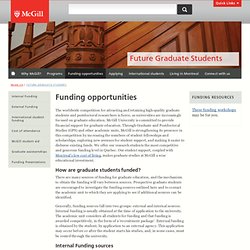
McGill University is committed to provide financial support for graduate education. Through Graduate and Postdoctoral Studies (GPS) and other academic units, McGill is strengthening its presence in this competition by increasing the numbers of student fellowships and scholarships, exploring new avenues for student support, and making it easier to disburse existing funds.
We offer our research students the most competitive and generous funding level in Quebec. Our student support, coupled with Montreal’s low cost of living, makes graduate studies at McGill a wise educational investment. How are graduate students funded? There are many sources of funding for graduate education, and the mechanism to obtain the funding will vary between sources. Internal Funding sources External Funding sources. Translation Certificate Programs. The graduate translation certificates provide students with an introduction to the methods, problems, technology, and theory of translation of the written word.
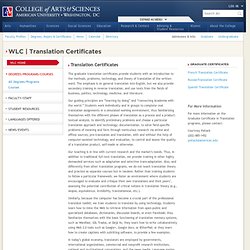
The emphasis is on general translation into English, but we also provide secondary training in reverse translation, and use texts from the fields of business, politics, technology, medicine, and literature. Our guiding principles are “learning by doing” and “connecting Academia with the world.” Our teaching is in line with current research and the market’s needs. Thus, in addition to traditional full-text translation, we provide training in other highly demanded services such as adaptation and selective trans-adaptation. Also, and differently from other translation programs, we do not teach translation theory and practice as separate courses but in tandem.
Similarly, because the computer has become a crucial part of the professional translator toolkit, we train students to translate by using technology. Recover From A Bad Interview. 7 Tips For A Fool-Proof Cover Letter. Jobs > Career Tips > 7 Tips For A Fool-Proof Cover Letter Here’s a question that a lot of job seekers ask: Is it really necessary to include a cover letter in a job application?
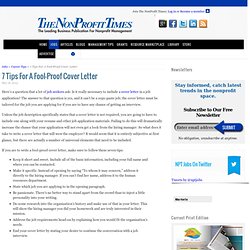
The answer to that question is yes, and it can’t be a copy-paste job; the cover letter must be tailored for the job you are applying for if you are to have any chance of getting an interview. Unless the job description specifically states that a cover letter is not required, you are going to have to include one along with your resume and other job application materials. Failing to do this will dramatically increase the chance that your application will not even get a look from the hiring manager. So what does it take to write a cover letter that will wow the employer? Take Free Online Courses. Earn College Credit. Research Schools, Degrees & Careers.
CLEP - College Level Examination Program (CLEP) -Save Time. Save Money. Take CLEP. American Geosciences Institute - Serving the Geosciences Since 1948. Employment in the geosciences may best be summarized by the types of employers.
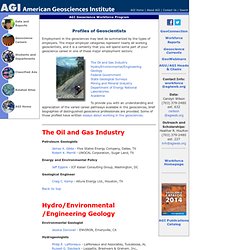
The major employer categories represent nearly all working geoscientists, and it is a certainty that you will spend some part of your geoscience career in one of these major employment sectors: The Oil and Gas Industry Hydro/Environmental/Engineering Geology Federal Government State Geological Surveys Mining and Mineral Industry Department of Energy National Laboratories Academia To provide you with an understanding and appreciation of the varied career pathways available in the geosciences, brief biographies of distinguished geoscience professionals are provided. Some of those profiled have written essays about working in the geosciences. The Oil and Gas Industry Petroleum Geologists James A. Energy and Environmental Policy Jeff Eppink - ICF Kaiser Consulting Group, Washington, DC Geological Engineer Craig C.
Back to top Hydro/Environmental/Engineering Geology. SAGE, Summer of Applied Geophysical Experience - Who Attends SAGE. Being a veterinarian is not always about puppies, sunshine, kitties and rainbows. This blog is about side the general public doesn't always see. Of course, there MAY be a cute kitten/puppy every now and then :)
Q&A Part 1: Deciding to go to graduate school, Questions 1-3. As a continuation of our ‘Path to Graduate School’ topic, we asked our SOEST graduate students to answer 15 questions about the graduate school experience.
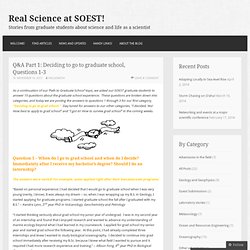
These questions are broken down into categories, and today we are posting the answers to questions 1 through 3 for our first category, “Deciding to go to grad school.” Stay tuned for answers to our other categories, “I decided, Yes! How best to apply to grad school” and “I got in! How to survive grad school” in the coming weeks. Question 1 – When do I go to grad school and when do I decide? The answers were varied! “Based on personal experience: I had decided that I would go to graduate school when I was very young (nerdy, I know).
“I started thinking seriously about grad school my junior year of undergrad. “I chose to go to graduate school immediately after receiving my bachelor’s degree, mostly because I felt like I had a lot of momentum going into it (that I didn’t want to lose by taking time off). Some did internships: Q&A Part 1: Deciding to go to graduate school, Questions 1-3.